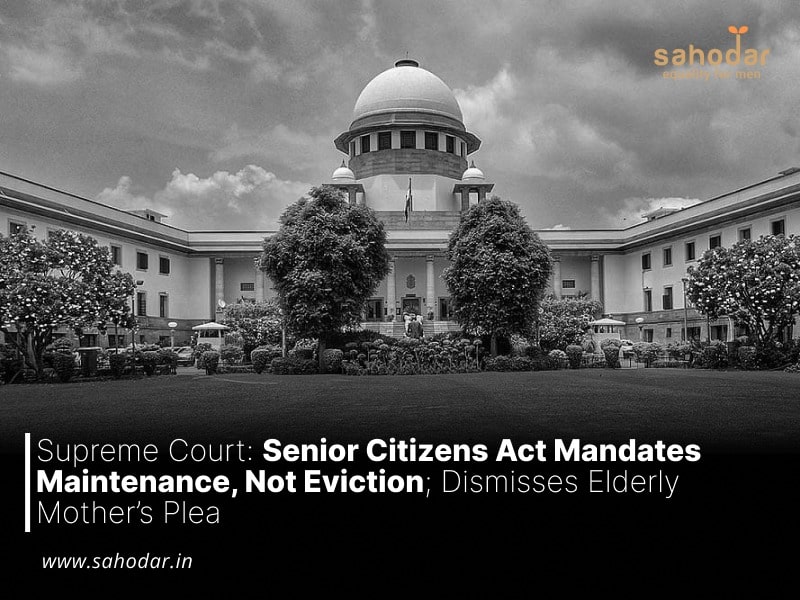In a landmark ruling that strikes a balance between the rights of senior citizens and the legal safeguards available to family members, the Supreme Court of India has clarified that while the Maintenance and Welfare of Parents and Senior Citizens Act, 2007 (Senior Citizens Act) mandates maintenance, it does not automatically grant the authority to evict children or relatives from residential properties — except in cases of exceptional circumstances.
The ruling was delivered in Civil Appeal No. __ of 2025 (arising from S.L.P. (C) No. 26651 of 2023), in the case of Samtola Devi v. State of Uttar Pradesh & Ors. In this case, Samtola Devi, a 68-year-old mother from Sultanpur, U.P., sought the eviction of her eldest son, Krishna Kumar, from the family home, alleging harassment and lack of support.
A bench comprising Justice Pankaj Mithal and Justice S.V.N. Bhatti dismissed the appeal on March 27, 2025, thereby affirming the 2023 judgment of the Allahabad High Court, which had quashed the eviction order issued by the Appellate Tribunal under the Senior Citizens Act.
Background of the Dispute
The case stems from a long-standing and deeply fractured family conflict. Kallu Mal, the late husband of Samtola Devi, owned House No. 778 in Khairabad, Sultanpur, which comprised three shops on the ground floor. The couple had three sons and two daughters. Over time, internal family tensions escalated, particularly involving their eldest son, Krishna Kumar, who was accused by his father of abuse and neglect.
In 2017, the elderly couple filed maintenance proceedings under Section 125 of the CrPC. The Family Court directed their sons, Krishna Kumar and Janardan Kumar, to pay Rs. 4,000/- per month each to both parents.
In 2019, citing ongoing harassment, the couple approached the Maintenance Tribunal under the Senior Citizens Act, seeking Krishna Kumar’s eviction. However, the Tribunal permitted him to continue living in a single room with an attached bathroom and to run his utensil business from one of the shops, with the stipulation that eviction proceedings could be initiated if he harassed his parents.
Unhappy with the decision, the couple filed an appeal. The Appellate Tribunal (District Magistrate, Sultanpur) reversed the previous order and ordered the eviction of Krishna Kumar. In response, Krishna Kumar challenged this ruling before the Allahabad High Court, which partially accepted his writ petition (Writ-C No. 35884 of 2009), setting aside the eviction while upholding other conditions.
Following Kallu Mal’s passing, Samtola Devi continued to pursue the case before the Supreme Court, seeking the complete eviction of her son.
Legal Arguments
Senior Advocate Pallav Shisodiya, representing the appellant, contended that the property in question was the self-acquired asset of Kallu Mal, and therefore, Krishna Kumar had no legal entitlement to reside in the house, especially considering his history of abuse and neglect. He referenced the Supreme Court’s ruling in Urmila Dixit v. Sunil Sharan Dixit & Ors. (2025) 2 SCC 787, to argue that eviction under the Senior Citizens Act is justified in such cases.
On the other hand, Senior Advocate S.K. Saxena, representing Krishna Kumar, disputed these claims, asserting that his client had consistently supported his parents, complied with the court’s maintenance order, and was lawfully residing in a single room with an attached bathroom while managing the utensil business inherited from his father. He further argued that the property was involved in ongoing civil litigation, as Krishna Kumar had filed suits seeking a 1/6th share in the house and challenging the validity of gift deeds made in favor of his sisters and brother-in-law.
Supreme Court’s Observations & Ruling
The Supreme Court, while reflecting on the unfortunate situation of intra-family disputes, made a poignant remark:
“In India we believe in ‘Vasudhaiva Kutumbakam’ – the earth is one family. However, today we are not even able to retain unity in the immediate family… We are on the brink of one person, one family.”
The Court noted that although the property was originally acquired by Kallu Mal in 1971, portions of it had since been transferred through gift deeds and sale deeds to his daughters, son-in-law, and even a third party (Amrita Singh). Additionally, one of the shops was gifted to his younger daughter, Anjali, who had subsequently rented it out.
Importantly, the Court noted that:
“If it is accepted that the house is self-acquired property of the father, and if he has already transferred it to his daughters and son-in-law, he ceases to be the owner. Hence, neither he nor the mother can claim eviction rights from the said property.”
The Court ruled that Sections 4 and 5 of the Senior Citizens Act primarily provide for maintenance rather than an absolute right to eviction. While eviction may be allowed under exceptional circumstances (as established in S. Vanitha v. Commissioner, Bengaluru Urban District, (2021) 15 SCC 730), it is a discretionary power rather than a mandatory one.
The Court observed that there was no evidence of recent harassment by Krishna Kumar following the 2019 Tribunal order. He had been consistently paying maintenance and was residing in a small, non-intrusive part of the house.
Hence, the apex court concluded:
“There was no necessity for the extreme step of eviction. The purpose could be served by ensuring maintenance and restraining interference in the life of the senior citizen.”
Key Takeaways from the Judgment
The primary objective of the Senior Citizens Act is to ensure maintenance rather than to mandate the eviction of family members.
- Eviction can only be ordered in exceptional and well-justified situations where there is clear evidence of harassment or danger to the senior citizen.
- Disputes related to ownership and property claims should be addressed separately through civil courts, as the Act does not supersede ongoing civil litigation.
- A child may possess an “implied license” to live in the parental home unless there is a clear demonstration of abuse or threat.

